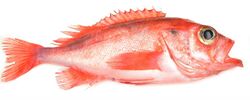Biology:Deepwater redfish
| Deepwater redfish | |
|---|---|

| |
| Scientific classification | |
| Domain: | Eukaryota |
| Kingdom: | Animalia |
| Phylum: | Chordata |
| Class: | Actinopterygii |
| Order: | Scorpaeniformes |
| Family: | Scorpaenidae |
| Genus: | Sebastes |
| Species: | S. mentella
|
| Binomial name | |
| Sebastes mentella Travin, 1951[1]
| |
The deepwater redfish (Sebastes mentella), also known as the beaked redfish, ocean perch,[2] Atlantic redfish, Norway haddock, red perch, golden redfish, or hemdurgan, may reach a size of 55–70 centimetres (22–28 in), but is usually less than 45 centimetres (18 in). It lives in comparatively high concentrations in the North Atlantic, for example in the Irminger Sea where considerable numbers are fished. It occupies depths between 300 and 1,000 metres (980 and 3,280 ft) and is often pelagic, i.e. far off the bottom. The deep-sea redfish feeds on a variety of food organisms, for example small fishes. In contrast to most fishes that spawn unfertilised eggs, the deepwater redfish has internal fertilisation and spawns free-living larvae.
Sebastes mentella is very similar in appearance to the Acadian redfish (Sebastes fasciatus).
Sustainable consumption
In 2010, Greenpeace International has added the deepwater redfish to its seafood red list. "The Greenpeace International seafood red list is a list of fish that are commonly sold around the world, and which have a very high risk of being sourced from unsustainable fisheries."[3]
References
- ↑ Froese, Rainer and Pauly, Daniel, eds. (2012). "Sebastes mentella" in FishBase. December 2012 version.
- ↑ Iucn Red List
- ↑ Greenpeace International Seafood Red list
- Postverk Føroya (Public Domain)
Wikidata ☰ Q1700062 entry






